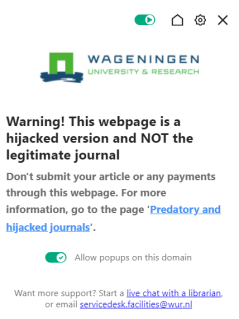
News
Use Lean Library to detect hijacked journals
Last week, the Library embedded a hijacked journal list into Lean Library. Now, you can check with the Lean Library plug-in if you're on a cloned journal’s website. This can prevent submitting and paying a publication fee to fake journals.
Hijacked Journal Checker

In collaboration with Retraction Watch, Anna Abalkina, developed the Retraction Watch Hijacked Journal Checker. WUR Library feeds this list into the Lean Library browser extension. From now on, when you’ve installed Lean Library, a warning shows up when you access a hijacked journal’s website.
What is journal hijacking?
Hijacked scientific journals are a long-standing problem in scientific publishing. It involves mimicking an established scholarly journal’s website and inviting authors to submit articles to the fraudulent site. The consequences of publishing in duplicated journals are substantial: hijacked journals can damage the reputation of journals and publishers, contaminate the scientific record, and adversely affect a scientist’s career.
What is Lean Library?
Lean Library is a tool that provides quick and easy access to subscribed online resources like databases and e-journals, as well as open access articles. You can download the browser extension for free to access the Library’s resources off campus.
Once you've installed the extension, select 'Wageningen University & Research' to activate it. The browser extension will show a pop-up message when you’re on a publisher’s website with licensed material. From now on, a pop-up message flags hijacked journal websites.
Disclaimer
The Library aims to keep Lean Library up to date. However, the ongoing cat-and-mouse game between malicious parties and Retraction Watch means the Hijacked Journal Checker will never be exhaustive. WUR Library cannot be held accountable for unidentified hijacked journals or predatory publishing practices.
WUR Journal Browser
The Library recommends always using the WUR Journal Browser to verify a journal's legitimacy before submitting your work. It provides the link to the legitimate journal's homepage. You can also check whether your journal of choice has an impact factor, how many WUR articles the journal published, and how often the journal has been cited by your WUR colleagues. Finally, the WUR Journal Browser provides information on Open Access options and possible discounts on the APCs.
Support
Are you still unsure about what to do? You can consult colleagues and peers in your field to see if they've heard or read about any problems with the journal you're uncertain about. In addition, you can always contact WUR Open Access support.
Further reading
Guide on predatory and Questionable Publishing Practices: how to recognize and avoid them.
Hijacked journals are still a threat — here’s what publishers can do about them
Hijacked-journal tracker helps researchers to spot scam websites